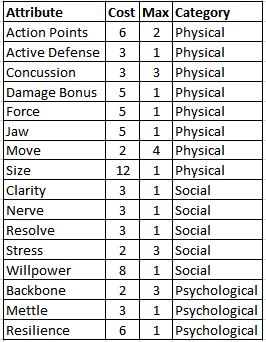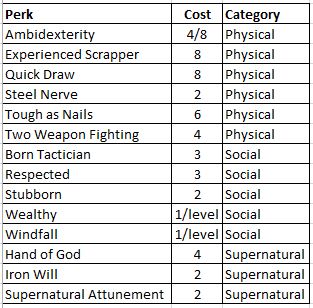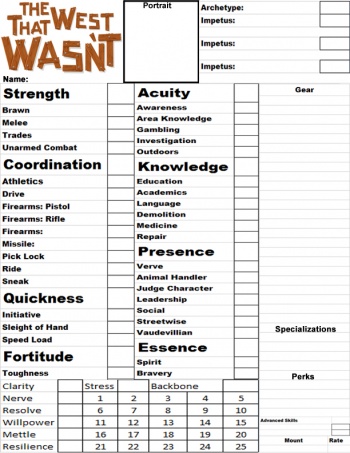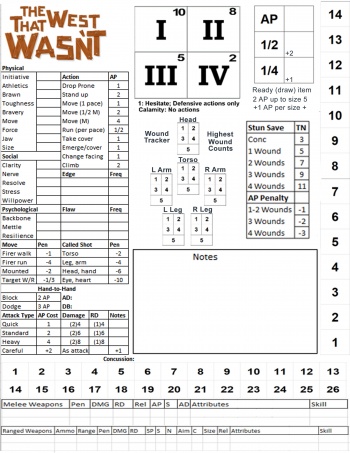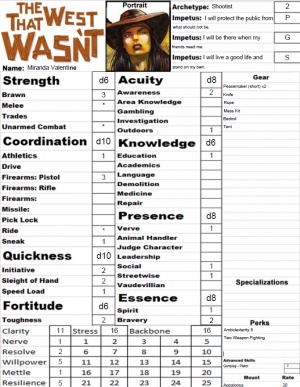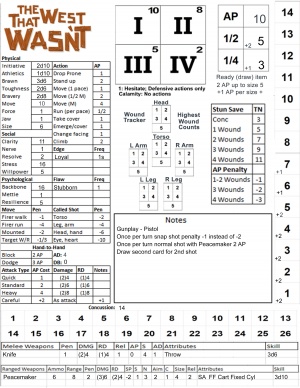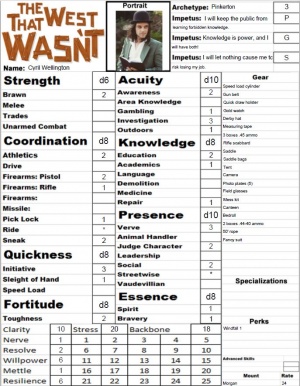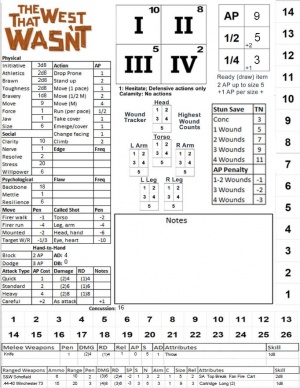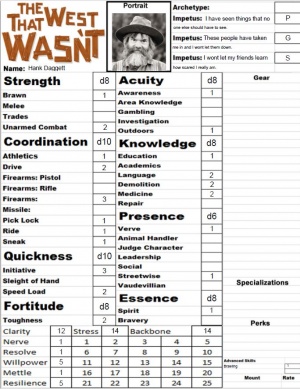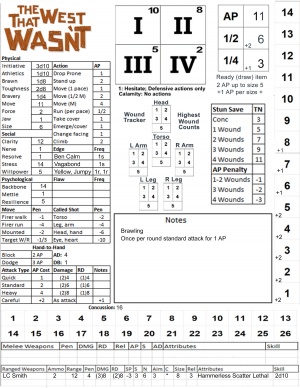Difference between revisions of "TWTW 3.0 - Hero Creation"
(→Trait Cost) |
(→Traits) |
||
| (One intermediate revision by the same user not shown) | |||
| Line 4: | Line 4: | ||
=Traits= | =Traits= | ||
| − | There are 8 Traits in ''TWTW''. These Traits are divided into three categories, A, B and C. These categories determine the CP cost to improve them. The category | + | There are 8 Traits in ''TWTW''. These Traits are divided into three categories, A, B and C. These categories determine the CP cost to improve them. The category C Traits are Knowledge, Presence and Essence. The category B Traits are Strength, Acuity and Fortitude. The category A Traits are Coordination and Quickness. |
==Trait Cost== | ==Trait Cost== | ||
| Line 15: | Line 15: | ||
|1 ||0 ||0 ||0 ||None | |1 ||0 ||0 ||0 ||None | ||
|- | |- | ||
| − | |2 ||4 ||2 ||1 || | + | |2 ||4 ||2 ||1 ||Upgrade Heroic Die |
|- | |- | ||
|3 ||5 ||3 ||2 ||Upgrade | |3 ||5 ||3 ||2 ||Upgrade | ||
Latest revision as of 20:01, 26 December 2021
In TWTW, each player controls a Hero. This Hero is their in-game avatar, and is represented by a set of traits, attributes and skills that define how that Hero interacts with the West. Heroes are created using a pool of points to define their strengths and weaknesses. Heroes are built on 130 Character Points (CP).
Traits
There are 8 Traits in TWTW. These Traits are divided into three categories, A, B and C. These categories determine the CP cost to improve them. The category C Traits are Knowledge, Presence and Essence. The category B Traits are Strength, Acuity and Fortitude. The category A Traits are Coordination and Quickness.
Trait Cost
| Rank | -A Cost | -B Cost | -C Cost | Effect |
| 0 | -2 | -1 | -1 | 1 Downgrade |
| 1 | 0 | 0 | 0 | None |
| 2 | 4 | 2 | 1 | Upgrade Heroic Die |
| 3 | 5 | 3 | 2 | Upgrade |
| 4 | 9 | 7 | 4 | 2 Upgrades |
| 5 | 15 | 12 | 8 | 3 Upgrades |
Each Trait begins at level 1. Beginning characters may have no trait above 4. Ranks are purchased incrementally, so it costs 5 points for a level 3 category B trait.
Attributes
Derived Attributes have a starting value based on other Traits or Attributes. See the Anatomy of a Hero section for more on determining starting values.
Cost is the CP cost for each improvement. Max is the maximum number of times the attribute can be improved.
Perks
Perks are divided into four categories: Physical, Social, Supernatural and Scene.
Scene Perks have a cost based on two factors: rarity and mitigation. Scene attributes can be common, uncommon or rare, and cost 3, 2 and 1 respectively. Mitigation is total or partial, and costs 3 or 1 respectively. Some example scene Perks:
Born Drunk: No penalties from drunkenness. 6 points (common*, total)
Desert Rat: Half penalties in desert conditions. 2 points (rare, partial)
Night vision: 4 points (common, partial)
Sure-Footed: No Coordination penalties from slick surfaces. 5 points (uncommon, total)
*Any situation a character has full control over the frequency of occurrence is considered common.
Flaws
Flaws do not cost CP, instead they give the character extra CP to spend. Flaws may have frequency of 1 or 2, and grant 3/5 CP respectively.
Edges
Rough Edges: 1 CP/Frequency
Sharp Edges: 2 CP/Frequency
Skills
| Level | Cost |
| 1 | 2 |
| 2 | 4 |
| 3 | 7 |
| 4 | 11 |
| 5* | 16 |
Levels are purchased incrementally, so it costs 6 points for a level 2 skill.
*Skills at level 5 may not be purchased during character creation, but skills can be improved to level 5 with experience.
Skill Specializations
Some skills have specializations. These cost 3 CP each.
Advanced Skills
Advanced skills have the same cost as regular skills, but have prerequisites as described in chapter 3.1.
Finishing Touches
After figuring out the nuts and bolts of the numbers that define your character and their abilities, you must decide on a bunch of other stuff that defines who your character is. Gotta have a name, of course. A gender. You'll want to figure out what kind of personality your character has. You should also have some kind of idea of your character's history, and where they came from. Depending on the story being crafted by the Judge, they may have some input or suggestions, so communication and collaboration is highly encouraged. Lastly, since the game is about getting things done, you will need to determine a few things that motivate your character into action. Each of these is called an impetus.
There are three different types of impetus: Posse, general and specific. The posse impetus is one that is shared by all the characters, and should be the same, or nearly so. The characters in the posse should be on the same side, and share some of the same views of the world; if characters were diametrically opposed (one black hat in the middle of a posse of white hats, for example), it is unlikely the group can survive the conflict and turmoil that a good story provides. To determine a posse impetus, the players should all decide a common ideal or goal that all their characters share or could support. A general impetus could be considered a "code of conduct," or a considerable aspect of the character's personality or how they behave. A specific impetus is more like a set of personal values or a driving goal. Impetus is important because it helps your characters when they are engaging in actions that ought to be of particular interest to them:
- Posse Impetus: Whenever you fail a task when working toward your posse impetus, you add 1 XP to the group XP pool. Failure helps the group to grow and learn (and not be so sore if things don't always go their way!)
- General Impetus: When attempting a task that directly relates to your general impetus, it can be invoked to cancel one downgrade. This makes tasks that are of personal importance to your character a bit easier.
- Specific Impetus: When invoking this impetus, you may take a Hero chip any time you fail.
Once you have these details figured out, note down that your character starts with $125 (plus any extra from the edges Wealth and/or Windfall), reference the chapter on Gear and outfit your character. You should now be ready to play!
The Character Sheet
The character sheet is designed to be more than just an information store, but also a play aid. One of the design goals of TWTW is keep the rulebook on the shelf, and to that end we make everything needed for play on either the Action Cards or the character sheet. Moreover, the character sheet is organized so that everything necessary for action scenes is located together, on the back page. This facilitates ease of use without constant flipping on the page, which also allows counters to be used for tracking purposes rather than erasing entries.
Combat Reference Sheet
The back page of the character sheet contains a collection of information that is useful during combat. Virtually everything needed for most combats is presented on this single sheet. What follows is an explanation on how to use the information that is presented.
Wound Tracker
The wound tracker shows each hit location with entries from 1-5 for wounds. As noted next to the graphic, only apply the penalty for the highest wound on the track.
Social Combat Tracker
At the bottom of the front page is the Social Combat tracker. All of the relevant SC traits are listed here, along with a tracker for Stress. The tracker can also be used for Backbone when tracking psychological wounds.
Anatomy of a Posse and Impetus
Our sample posse consists of three hombres, with very different, but complimentary, backgrounds. Each of them has seen more than they wish, and knows that the mission of the DTI is vital to the well-being of those who will populate the frontier. Because this is a posse of DTI agents, they will all choose a posse impetus that reflects their mission.
Our first character is Miranda Valentine, a shootist who went out west because of her duty with the DTI. She chooses to phrase her impetus as follows: I will protect the public from things that should not be. She views her job as something akin to a parental duty. The public at large cannot know of the existence of the supernatural entities, and, moreover, those entities should not exist at all.
Next comes Cyril Wellington, a Pinkerton city-slicker turned DTI agent. He came west because of his DTI connection as well, but he has a very different motivation, which is clear in his impetus: I will keep the public from learning forbidden knowledge. To him, it is about the knowledge of the supernatural, and they should not learn anything of it. This is explored more, later, in his specific impetus.
Finally, Hank Daggett is our only member who is from the west, being born in Texas. His experience has changed who he was, and made him skittish and edgy. He does not want anyone else to experience this, so his impetus is: I have seen things no one else should have to see. His motivation is driven more by fear, than responsibility like Miranda, or authoritarian greed like Cyril.
Each character also has a general impetus. This is a broad statement about who the character is, like a code of conduct or moral compass. Again each of them distinguishes them self in their own direction with the content of this impetus.
Miranda grew up with the sting of abandonment, and so she vows that will never be who she is. Her general impetus is: I will be there when my friends need me. She has chosen who will be in her circle, and she will ensure that group remains safe. This cements her role as a parental figure, towards the public as well as her chosen family.
Cyril deepens his connection to the DTI mission with his impetus: I will let nothing cause me to risk losing my job. He is consumed by his job, which gives him purpose and forwards personal goals, which will be illustrated with his specific impetus, as well.
Hank projects a sense of community with his comrades via his general impetus: These folks have taken me in, and I wont let them down. He knows what it is like to be out there all alone, and now that he is not, he will do whatever it takes to keep his group intact.
The final impetus is a specific, something which is deeply personal to the character as a driving force.
Miranda states in plain and powerful language who she is inside with her specific impetus: I will stand on my own two feet and live a good life. Her fierce desire to be self-sufficient and pursue what is good (in her view) is what defines her. Combined with her other three statements, she is someone who prides herself on being reliable, capable and honorable.
Cyril rounds out his impetuses with a direct statement of why his job is such a driving force for him: Knowledge is power, and I will have both! His impetus set shows that he will simultaneously keep knowledge from the general public, while hoarding it for himself. This, he reckons, will lead to personal power that he desires.
Hank has seen too much, and he wants to be sure his compadres do not know how deeply that has affected him: I cant let my friends see how scared I am. This statement of both fear and shame illustrates why he acts the way he does and illustrates who he is as a person.
Note how all three characters in the posse have very different backgrounds and motivations behind their impetus, but each of them all point toward compatible goals. By having a party impetus that must be related to their job with the DTI, each character defines why being part of the story will be important to them. The posse impetus ensures that each member is strongly motivated to participate in the adventures to come.
Impetus Creation Guidelines
An impetus is a driving force for the character. As such, each impetus should be a strong, declarative statement about the characters behavior. The impetus should not only describe what their actions are likely to be, but also give insight into why those actions are chosen.
All of the impetuses from the sample characters are constructed either with "I will" or "I cant/wont". It is not required to use this exact structure, but using these constructs, especially for your first few characters, ensure an impetus that is strong and playable.
Sample Character: Miranda Valentine
Rumi wishes to create a gunslinger character whose past is riddled with abandonment, which leads her to be independent, but fiercely loyal to the friends she lets into her circle. She peruses the archetypes and decides that a Shootist would be the perfect fit for what she has in mind, so she selects that for 12 points.
Next she moves on to the five career skills for the archetype and assigns ranks to those. Before assigning levels to her skills she purchases her traits, selecting 2 at 10, 4 at 8 and 2 at 6. The 10s are assigned to Coordination and Quickness (coordination being the prime trait for her archetype), the 8s to Presence, Acuity, Fortitude and Essence, with Strength and Knowledge remaining at 6.
For trait skills, she decides to upgrade Brawn to 3, and Awareness, Initiative and Toughness to 2. The others she leaves at 1.
For archetype skills, she decides not to take Ride, Melee and Unarmed Combat. With her Brawn at 3, she will still have 3d6 in both fighting skills and be a competent brawler. Her Ride will only be 1d6, so she will avoid any saddle shenanigans when possible.
Looking at the advanced skills, she decides that she would like the Gunplay - Pistol skill at 3. This means she will need Firearms: Pistol at at least 3. She chooses level 3 in both. Finally, she takes two perks: Ambidexterity and Two Weapon Fighting. This puts her at 129, so she takes a flaw, Stubborn. Since she has a Flaw, she also needs a sharp Edge, so she selects Loyal. Then she fills in the rest of the skills as follows:
Now all she needs is some gear and she is ready to journey to the west...
Sample Character: Cyril Wellington
Sometimes when you look too much, you see things you should not. And sometimes, the allure of what you should not know becomes a driving force in your life. Such is the case with Cyril Wellington. He became a Pinkerton because he was good at finding the truth: through conversation, science or other means. Growing up in New Jersey, and spending most of his early adulthood in New York, he is a new arrival in the west, but a greenhorn he is not.
He begins with traits, and spends 50 points to upgrade Coordination, Quickness, Fortitude, Knowledge and Essence to 8, and Acuity and Presence to 10. Cyril has been a lot of places and done a lot of things, he is well rounded. Next 12 points are spent on the Pinkerton archetype. He raises the trait skills for Presence and Quickness to 3, and the rest to 2, except Essence, for 20 points. Leaving 60 for skills.
He decides to buy the following skills: Firearms: Pistol and Rifle, Pick Lock, Sneak, Fast Draw, Gambling, Investigation, Outdoors, Academics, Repair, Social Combat, Judge Character and Bravery. He leaves both Streetwise and Ride to use his default from the Pinkerton archetype. He has one point remaining that he spends on windfall. During his time in the east he acquired more than just knowledge.
Sample Character: Hank Daggett
Hank was born on the frontier, in Texas, and heeded the siren's call of the gold rush when he was young. Once, during his travels, he came across a ghost town. He saw things he could not explain and the experience chilled him to his bones. Ever since, he has eked by on the fringes of society, and running scared. He has picked up a variety of skills in his travels, and a few peculiarities.
He begins with traits and spends 53 points. He upgrades Strength, Fortitude, Acuity, Knowledge and Essence to 8. Being a bit jumpy and skittish, he upgrades his coordination and quickness to 10. He tends to keep a low profile, so his Presence traits remains at 6. He raises the trait skill for coordination to 2, and raises Acuity, quickness and Fortitude to 3 (the better to notice danger and get the jump on or away from it, and to stay alive if he fails to do either!) Hank also increases his move by 3 to 11 for 6 points, to help him get out of trouble if he needs it.
Hank has developed the sharp edges of Beneficent Calm (x2) to help still his jangled nerves when he needs to come through in the clinch, and Vagabond (x2), to represent his varied knowledge over the years that might come in handy. He also has the rough edges Yellow-Bellied and Jumpy (both x1) due to the horrors he has seen in his travels. It may make him a bit less reliable at times, but that which doesn't manage to kill you makes you stronger, right? He also takes the perk Windfall for a bit extra starting money. This all costs 12 points, leaving him 60 points for skills.
Hank's player opts not to choose an archetype, imagining Hank as a sort of "Jack-of-all-trades," and uses the points he might have spent on an archetype on additional skills and skill levels. He chooses the following skills: Unarmed (with the advanced skill of brawling), drive, firearms (shotgun, with a specialization in snap shots), ride, sneak, pick lock, sleight of hand, speed load, outdoors, language (Sioux and Spanish, speak only), demolitions, medicine and streetwise. Seeing that neither Miranda or Cyril have taken it, Hank's player decides that sometime in his past, Hank might have learned a thing or two from a sawbones, and takes the medicine skill, as well, so he can be the group's "doctor," even though he probably won't be very good at it with only 8 in Knowledge.
